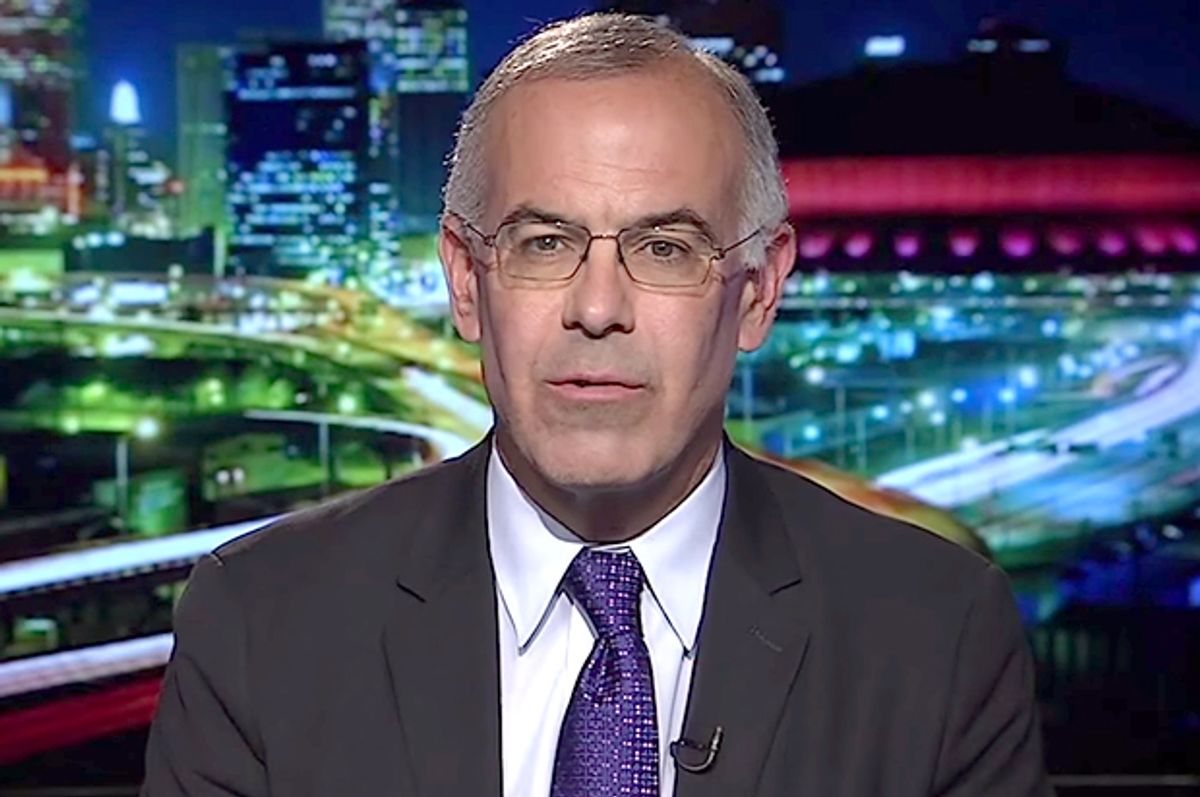As the clock winds down on another midterm election that will likely reward Republicans for their policy-free, Obama-hating obstruction, trust David Brooks to identify an allegedly crippling social disorder, which he calls “partyism.” In a country still riven by race, Brooks has the nerve to brand Americans who may disdain people of another political party as indulging a “prejudice” akin to racism.
“To judge human beings on political labels is to deny and ignore what is most important about them,” he writes. “It is to profoundly devalue them. That is the core sin of prejudice, whether it is racism or partyism."
See what he did there? We already had a functional word for this condition -- it’s “partisanship” -- but call it “partyism” and you’ve got another loathsome “ism,” so easily twinned with racism. I would argue that someone’s political views and values are at the top of “what is most important about them” – and we have every right to choose not to befriend or marry people whose politics we abhor.
We don’t have the right to harm or harass them or refuse to hire them (except in certain jobs where political values and opinions are intrinsic to the job duties), but that’s not what Brooks is talking about here. He’s preaching a bizarre conservative version of the right’s caricature of the liberal nanny-state nightmare: Everybody just be nice to everybody! He’s a parody of a young women’s studies major discovering the concept of “looksism,” which he would no doubt mock.
This is Brooks at his dumbest. Which is, sadly, saying a lot. You can be forgiven if you stopped reading when he claimed, “In fact, the best recent research suggests that there’s more political discrimination than there is racial discrimination.” Is Brooks aware of “recent research” showing that black people without criminal records are less likely to get a job than a white applicant with a criminal record? That African-Americans face persistent discrimination in hiring, wages, bank lending, criminal prosecution and so much more?
The cancer of partyism is likely to become a cause for the tiresome folks who can’t believe we haven’t chucked democracy and turned the country over to the Simpson-Bowles commission, with a Supreme Court made up of No Labels folks. Of course, it’s also a great discovery for purveyors of “both sides do it” false equivalence, because Brooks makes the case it afflicts liberals and conservatives alike – even though the 2010 poll he cites shows that Republicans are much more likely to be “partyist” than Democrats. Half of Republicans compared with a third of Democrats say they’d be “displeased” if a child married someone from the other party. It was 5 percent and 4 percent, respectively, in 1960.
Disdaining someone for their politics has nothing in common with racial prejudice, which is irrational and ugly and imputes intrinsic inferiority, even evil, to another group. “Political discrimination,” another Brooks phrasing, is part of democracy. It’s certainly what we do when we vote. Politics is a way of living our values, and sadly for the country, the Republican Party’s core values have become skewed in a way that many of us find morally disturbing – and more to the point, in ways that lead conservatives to label liberals the enemy, not merely the loyal opposition.
It’s true: If my daughter came home and announced she was marrying a Republican, I would be concerned, until I got to know his values. Does he support lower taxes and less regulation? Well, so do a lot of my friends. That’s not a problem for me. But what about women’s equality? Voting rights for everyone? Marriage equality and LGBT rights? Is he sharing racist email chains showing President Obama dressed like a witch doctor, or the first lady as a chimp? Or the jokes comparing welfare recipients to dogs that made their way around Wisconsin Gov. Scott Walker’s office?
Does he poison himself by listening to Fox News every night? I’d worry about that the same way I’d worry if I learned my daughter’s intended sat on the sofa and consumed a fifth of vodka every night. The anger of Bill O’Reilly is corrosive and addictive.
And if my daughter didn’t pass muster with her (theoretical) Republican future in-laws -- and remember, polls say that's more likely than my, as a Democrat, objecting to their son -- I’d say that was fine, and remind her that she could, and certainly would, do better. They obviously have terrible values.
I say this as someone who has Republicans in my family, and even a few in my close circle of friends. I used to have more Republican friends, but they realized how far right their party had moved and either became independents or Democrats.
It makes perfect sense that there’s much more political friction between Americans than there was in 1960. The Republican Party of 1960 was led by Dwight Eisenhower; today its loudest voice is Rush Limbaugh. Its northern flank was crucial to passing the Civil Rights and Voting Rights Acts of the mid-1960s. Then came the Southern Strategy (and its northern component), which relied on stoking white fear and backlash and convincing the “silent majority” that Democrats were Communist baby-killers who coddled black criminals and aimed to turn the country over to the Viet Cong.
The GOP has moved steadily to the right since the mid-1960s, turning its back on its civil rights legacy and on its commitment to women’s rights too. There are libraries full of research showing that the Republican “center” has moved right, while Democrats have actually moved to the center.
There’s so much wrong politically right now; having a leading national opinion columnist invent a fictional malady called “partyism” is just another example of it. The real problem is Brooksism: ignoring that your party has moved so far right it no longer cares about governing.

Shares